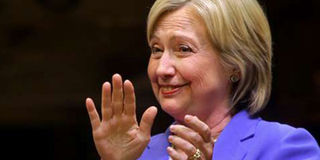New world order as women at the helm of superpowers

Democratic presidential candidate Hillary Clinton greets the audience after speaking at the Richard Rodgers Theatre following a special performance of the Broadway musical "Hamilton" on July 12, 2016 in New York City. If elected president, Mrs Clinton will join a host of other women from around the world who are re-defining the position of women in global political and economic affairs. PHOTO | AFP
What you need to know:
- Backed by a solid economy, which gives her a large purse that other countries in European Union (EU) cannot afford, Merkel has gone about shaping Europe in her image.
- In 2012 South Africa’s Nkosozana Dlamimi Zuma was elected the first female head of the African Union Commission. She served as South Africa’s foreign minister prior to joining AU.
Should Hillary Clinton be elected the president of the United States of America this November, it will crown a remarkable ascent of women to pinnacle of global leadership positions.
Mrs Clinton will join a host of other women from around the world who are re-defining the position of women in global political and economic affairs.
“If Hillary is elected president, it will be an extraordinary moment in human history. Women will literally be running the world,” wrote Gatlin Geier in the New Republic magazine of the U.S.
She wrote this after Theresa May was sworn in this week as the Prime Minister of Britain, the second ever woman to hold the position after Margaret Thatcher in 1990.
Mrs May joined the other power woman of Europe, Germany’s Chancellor Angela Merkel who has been in power since 2005. She has been voted the most powerful female person in the world for six consecutive years by the Forbes Magazine.
Backed by a solid economy, which gives her a large purse that other countries in European Union (EU) cannot afford, Merkel has gone about shaping Europe in her image.
If Clinton is elected, the three leading economies in the West - USA, Germany and Britain - will be under the leadership of women, observed the New Republic, reflecting on what the rise of women mean for the world.
But that’s not all. Beyond the boarders of their countries, women are gunning to be leaders of key influential global institutions as well.
Bulgarians Irina Bokova and Kristalina Georgieva are front runners to succeed Ban Ki-Moon as the Secretary-General of the United Nations when his term expires in December.
Whoever between them is elected will be the first ever female to head the UN since its formation in 1945.
She will join French woman Christine Lagarde, the head of the International Monetary Fund as women running powerful global institutions.
In Brazil, Dilma Rousseff succeeded the popular Luiz Inacio Lula da Silva as president in 2010. She was impeached in May this year.
PROMINENT LEADERS
In Argentina Cristina Fernandez de Kirchner retired from politics in December last year after a 10 year stint in power. She succeeded her husband Nestor Kirchner in 2007.
In Burma, former long-time political detainee was released by the military Junta Aung Sang Suu Kyi and now is the First State Counsellor of Myanmar (another name for Burma).
In Africa, Liberia’s Ellen Johnson Sirleaf became the first female president in the continent in 2006 after defeating footballer George Weah.
In Malawi, Joyce Banda was elevated to the presidency following the death of President Bingu wa Mutharika in April 2012. She served until May 2014.
Last year, Ameenah Gurib Fakim was elected the first president of Mauritius. She was ranked number 96 in the Forbes Magazine list of 100 most influential women of 2016.
In 2012 South Africa’s Nkosozana Dlamimi Zuma was elected the first female head of the African Union Commission. She served as South Africa’s foreign minister prior to joining AU.
In February 2013, South Korean elected Park Guen-hye as their first female president. Beata Szydlo has been the Prime Minister of Poland since November last year.
Others include Prime Ministers Sheikh Hasina Wajed of Bangladesh, Portia Simpson Miller of Jamaica and President Michelle Bachelet of Chile.
The rise of women, could mean a more peaceful world order, said the New Republic magazine. “Research has consistently shown that women tend to exhibit a more cooperative style of political leadership,” it said.
“Some feminists may be pinching themselves, but others are far more ambivalent about this scenario. The pulverising of so many of the world’s highest, hardest glass ceilings is enormously gratifying.
But far more important to the fate of the world’s women is the ideology of these leaders and the political constituencies they represent. On that score, the world’s most powerful women have a mixed record at best,” it said.





